Saudi Arabia plans to make its capital market more accessible to foreign investors by giving them full access to NOMU, a parallel market recently launched for small and medium-sized enterprises, Mohammed El Kuwaiz, chairman of the Capital Market Authority (CMA) said on Thursday.
Non-resident foreign investors will be able to invest directly in the parallel market starting from January 1 next year.
This step comes within CMA’s strategic plans that aim at achieving Saudi Vision 2030. It also falls under the framework of organizing the financial market and developing its role in supporting the national economy.
Kuwaiz affirmed that this step goes in tandem with the methodology followed by CMA which seeks to open the financial market for foreign investment.
The methodology stands on the concept of treating the foreign investor as the Saudi investor by empowering him to invest directly in the parallel market NOMU without having to be a QFI (Qualified Foreign Investor).
This step seeks to permit additional categories of investors to invest, at a time when qualification conditions required from foreign investors are the same as those requested from Saudis, Kuwaiz stressed.
CMA issued earlier a Guidance Note of the Investment of Non-Resident Foreigners in the Parallel Market that aims at clarifying the investment mechanism and restrictions related to it. Remarkably, categories allowed to participate in NOMU included qualified foreign investors and final beneficiaries in barter agreements. However, the guidance note included non-resident foreign natural people and legal entities complying with the stipulated standards in the definition of the qualified investor.
The first reaction to the CMA decision was that NOMU index rose 6 percent during Thursday’s trading, closing at 3,192 points.









